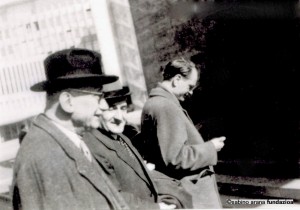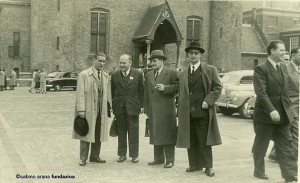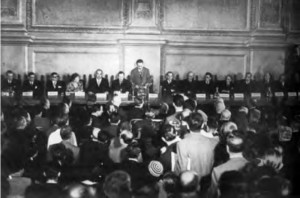by Alexander Ugalde Zubiri.
The Eurobask association (Basque Council for the European Movement / Europako Mugimenduaren Euskal Kontseilua) already has a track record of more than six decades, since it was created in Paris in February of 1951 with the name of Basque Council for the European Federation. Since then it has gone through various historical periods, and can be considered to be a diverse organization representing the Basque Country in private entities advocating Europeanism and Federalism in Europe.
Its background goes back to the first decades of the 20th century, when various Basque political and social forces were watching events take place in Europe and, in particular, the successive proposals to initiate a process of European integration. Already at that time, they were looking for a fit for the Basque Country (either belonging to the Spanish State with a certain level of autonomy or even in a future scenario of a hypothetical independence) in a federalist setting on a national, European and global level.

Berlin, 1956. The Basque President J.A. Agirre together with Robert Schuman, regarded as one of the “Fathers of Europe.” Photo: © Sabino Arana Fundazioa
After World War II and in the environment of the exile (caused by the outcome a few years before the Spanish Civil War of 1936-39) the first politically wide Basque pro-European Organization emerged, supported by Nationalists in their two parties (PNV and ANV), Socialists (PSOE), and Republicans (IR and UR): the Basque Federalist movement was created in 1947. Its delegates attended the historic Congress in Europe (The Hague, May 1948).
Shortly later a Basque Council was formed in order to participate in the creation of the Federal Spanish Council of the European Movement (CFEME) and, through this, the International European Movement. This took place in the delegation of the Basque Government (then operating in exile) in Paris in February of 1949. The Catalan Council, “Unión Liberal” and Socialist Movement by the United States of Europe were also participants; later the Galician group, a group of Royalist Europhiles and Federalist Christian Democrats group joined.
This Basque Council was finally formalized two years later with the founding of the Basque Council for the European Federation, held on February 1, 1951 at the headquarters of the Basque Government in Paris. Its leaders were people named from a wide spectrum of political tendencies: Gonzalo Nárdiz (President); Jesús María Leizaola, Lasa Laureano and José María Lasarte (Vice-Presidents); Francisco Javier Landaburu (Secretary); Ramón María Aldasoro (Delegate to CFEME); Manuel Irujo (Propaganda); and Víctor Gómez, Iñaki Renteria, Iñaki Aguirre, Julio Jauregui and Ramon Agesta (Members).

F.J. Landaburu (1st from left), J.A. Aguirre (3rd) and J.M. Leizaola (4th) in Brussels in February 1949 on the occasion of the International Council of the European Movement. Photo: © Sabino Arana Fundazioa
During the entire period of the Franco Dictatorship (until the mid-1970s) this organization was the benchmark for the Basque pro-European approaches in political, economic, social and cultural dimensions. In addition to working toward other contributions such as the denunciation of the situation in the rest of Spain and working with the opposition to Franco’s regime (for example, participating in the meeting at the Congress of the European Movement in Munich in 1962, which the Franco regime referred to in a pejorative way as “conspiracy”).
In the second half of the 1970s, obviously within the framework of the new Spanish State climate of those years, organizations that made up CFEME, among them the Basque Council, were transferred, according to the language of that period, to the “inside” (to the Basque territory free from the dictatorship). But given that the priorities of the political forces were at that time others, the majority of them just barely kept active. During the 1980s there were conversations between various Basque political parties to reactivate the Basque Council, but this was not achieved, not even when Spain joined the European communities.
Finally in 1994 after new interaction, it was decided to reactivate the Basque Council for the European Federation, 43 years after its foundation. So in April of 1994 a “re-launch manifesto” was disseminated in the Basque Parliament and in May it was presented publicly in Gernika-Lumo. In addition to its revitalization and reorganization, it was decided to change its name: Basque Council of the European Movement / Europako Mugimenduaren Euskal Kontseilua (CVME/EMEK).
Despite the changes made, the CVME/EMEK maintained a line of historical continuity, although its goals were redirected for the current times: to contribute to the development of the relations of the Basque Country with other peoples; to broadcast within Basque society about the need for a united and diverse Europe; to maintain democratic ideals and social and political invigoration of the construction of the European Union; and to promote the participation of citizens in European elections and institutions. Likewise, they continued their membership in the Federal Spanish European Council of the European Movement and International European Movement.
In the following years the organization increased its activities and settled in. In 2001, several events were held to commemorate the 50th anniversary of its founding.

2nd Congress of the European Union of Federalists. Rome, November 1948. The Basque figure F.J. Landaburu at the presidential table.
Photo: Landaburu Family Archive
Currently the members of Eurobask span the majority of political parties and Basque Unions, the three provincial Governments of the Autonomous Community of the Basque Country and local governments, universities and all kinds of social and cultural organizations and associations. Obviously they all share the main objectives of Eurobask, even though each of them has its own perspective on the present and future of the process of community integration.
In order to obtain a historical evaluation of the Basque Council for the European Federation, created in 1951 and re-launched in 1994 as Basque Council of the European movement, we can summarize:
1.- During the first decades of its existence (1950s to 1970s), it contributed from exile to denounce the Franco Dictatorship in the Spanish State and, together with political organizations and other associations and the Basque Government, maintained the basic demands of the Basque cause.
2.- In the same sense, the Basque Council was one of the fundamental drivers of the Federal Spanish Council of the European movement, a meeting place of Spanish, Catalan, Galician and Basque opposition to dictatorship.
3.- It has been and is the main Association of sectorial measures specifically devoted to monitor the process of European integration from a Basque perspective, assessing their political, economic, social and cultural dimensions.
4.- It has contributed to international Basque visibility and its presence at a European level, in particular, participating in private pro-Europe federalist movements, as is the case of the international European movement.
5.- Nowadays Eurobask is, as we have indicated, a broad association in terms of organizations and entity members as well as diverse in its ideological and political approaches. There are thus different estimations and degrees of critical positions on the political, institutional, economic, social, international performance, etc., of the current European Unión.
 |
Alex Ugalde Zubiri is a graduate in History; PhD in Political Science and Sociology; Professor of International Relations at the University of the Basque Country (UPV/EHU) |


Be the first to comment on "Eurobask: 63 Years of Pro-European and Federalist Activity"